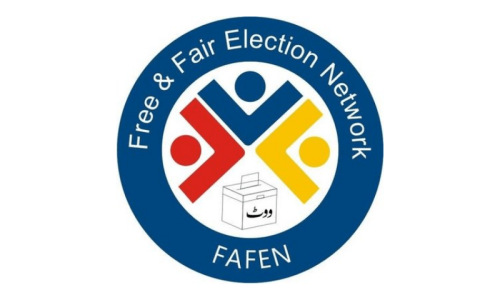KARACHI: It’s been said that you can get most things you want in Karachi, but this writer have always found three things to be in exceedingly short supply here — exponents of classical qawwali, practitioners of dhrupad, and a collection of listeners that have the wherewithal to understand and appreciate the difference. Fortunately, all three of these rarities were available in bucket loads at a tribute event held to honour the legacy and musical contributions of Ustaad Raees Ahmed Khan Nizami at the Pakistan American Cultural Centre (PACC) on Saturday evening.
Led by Ustaad Raees’ grandsons Ayaz Nizami and Faizan Nizami, the gathering served as a reminder of the legacy of the musical lineage, the Hapur gharana, to which these qawwals belongs.
When stripped down to its essence, qawwali is all about the momentum the qawwals are able to generate and the reciprocal relationship they are able to establish with the samaeen [audience]. As far as momentum was concerned, Ayaz and his troupe came more and more into their element as the night wore on and as the crowd thickened.
Shirking convention by starting with the saadraAllah Hoo Allah in 10 maatray [beats] instead of the conventional opener Man Kunto Maula (that came later), the qawwals were able to harness the potent sonorous harmony of Raag Behro to give us a taste of what they had in store for the rest of the evening. Some of the qawwalis performed included the usual fare, such as Mere Bane Ki Baat Na Poocho, Rung, Chapp Tilak and Gar Nari — with the qawwals particularly excelling in their renditions of Khabaram Raseeda and Phool Rahi Sarson, which brought the gathering to a collective boil.
The grandsons of Ustaad Raees Ahmed Khan Nizami paid tribute to his musical legacy
But where Ayaz really hit his stride was when he stepped away from this oft-beaten path and ventured into territories that few of his contemporaries dare to, or care to, traverse. Three renditions stood out in particular, with the first being Ustaad Raees Nizami’s composition of Jahan Roshan ast az Jamal-e-Mohammad. The fact that this was composed by Ustad Raees Nizami in 12 maatray in Raag Jog makes it notoriously difficult to execute adeptly. His grandsons, however, were more than up to the task.
The second highlight of the night was the qawwals’ rendering of a dhrupad composed by Mian Bahadur Khan, Ayaz Nizami and Faizan Nizami’s great-grandfather, in Raag Puriya Dhanashree. “Only a handful of folks across Pakistan and India perform this,” Faizan revealed shortly before launching into the dhrupad. “This is our virsa [heritage] and we intend to safeguard it for future generations.” I’ve been fortunate enough to hear khayal on the rare occasion in Karachi, but hearing dhrupad is even rarer still, and any man who holds a great command over dhrupad — as Ayaz Nizami does — is well worth his weight in gold.
Finally, exponents of classical music and khanqahi [traditional] qawwali will know that the exacting nature of performing aalap and aakar in Raag Zilaf demands a genuine mastery of one’s own voice and temperament. The sargam astai the Nizami ensemble performed in this raag, also composed by Mian Bahadur Khan, made it evident that their strength lies in harnessing the technical power and brilliance of the more complex aspects of classical music — a speciality which is offered limited space and attention, if any, these days.
It is worth mentioning here that perhaps no one at the gathering had a greater time than the scholar and writer Dr Aliya Imam, who sits on the cusp of 100 yet possesses more alacrity than most people quarter her age. Not only would she spontaneously hurl the choicest Urdu couplets at the qawwals to bolster their vigour but she also ended up spending the night more on her feet rather than on her seat due to the sheer number of people that insisted she accompany them as they presented the qawwals with money as an expression of their gratitude. Ultimately, if Dr Aliya Imam was satisfied with what Ayaz Nizami and his troupe had to offer, who am I say to otherwise?
Published in Dawn, October 16th, 2023













































Dear visitor, the comments section is undergoing an overhaul and will return soon.